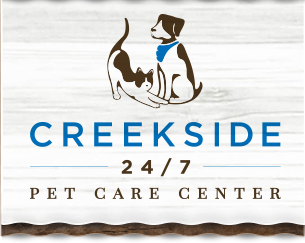Dog diarrhea is not just unpleasant for you and your pet; it can also be a sign of a more serious issue. While mild cases can resolve on their own or with a visit to the veterinarian, sometimes diarrhea can indicate a medical emergency that requires immediate attention. Understanding when to seek help is crucial for your dog’s health and well-being. This article aims to help you identify when your dog’s diarrhea is an emergency and requires urgent care at Creekside Pet Care Center in Keller, Texas.
Recognizing Normal vs. Abnormal Dog Diarrhea
Diarrhea in dogs can range from mild to severe and can vary in color, consistency, and frequency. Recognizing the difference between normal diarrhea and signs of a more serious issue can help you determine whether your dog needs emergency care.
Normal Diarrhea Characteristics
Normal diarrhea in dogs typically features mild symptoms, such as slightly loose stools that resolve within a day or two. Dogs with mild diarrhea remain active, playful, and generally don’t show significant changes in behavior. You may notice an increased frequency of bowel movements, but it should not exceed 3-4 times in 24 hours. Often, normal diarrhea is linked to a sudden change in diet or food intolerance.
Abnormal Diarrhea Characteristics
Abnormal diarrhea includes symptoms like persistent diarrhea lasting more than 48 hours or noticeable blood in the stool, either bright red or black. Behavioral changes such as lethargy, vomiting, loss of appetite, or sudden weight loss can indicate a more serious issue. Additionally, more than four bowel movements within a short timeframe or stools with unusual colors (e.g., green, yellow, black) or extremely watery consistency warrant attention. If your dog displays any of these characteristics, it’s essential to contact Creekside Pet Care Center at (817) 421-5850 immediately to determine if your dog needs emergency care.
Common Causes of Dog Diarrhea
Understanding the possible causes of diarrhea in dogs can help you identify whether the issue is mild or severe. Here are some common reasons for dog diarrhea:
- Dietary Changes: Sudden changes in diet or the introduction of new treats can lead to mild diarrhea.
- Food Intolerance or Allergy: Some dogs have intolerances to specific foods, causing gastrointestinal upset.
- Parasites: Intestinal parasites like Giardia or roundworms can cause persistent diarrhea.
- Infections: Viral (parvovirus, distemper) and bacterial infections (salmonella, E. coli) are known to cause severe diarrhea.
- Toxins: Ingesting harmful substances, such as chocolate or certain plants, can result in acute diarrhea.
- Medical Conditions: Liver disease, kidney failure, or inflammatory bowel disease can cause chronic diarrhea.
- Stress and Anxiety: Significant changes in routine or environment can lead to stress-induced diarrhea.
When Dog Diarrhea Requires Immediate Veterinary Care
Certain situations warrant immediate medical attention, as they could indicate a life-threatening issue. If your dog shows any of these symptoms in addition to diarrhea, it’s time to seek emergency care at Creekside Pet Care Center.
Severe Symptoms Requiring Emergency Attention
- Bloody Diarrhea (Hemorrhagic Gastroenteritis)
- Vomiting and Diarrhea
- Lethargy and Weakness
- Dehydration
- Fever
- Abdominal Pain
- Rapid Weight Loss
High-Risk Groups Needing Urgent Care
- Puppies: Young puppies are particularly susceptible to dehydration and infections like parvovirus.
- Senior Dogs: Older dogs often have weakened immune systems and require closer monitoring.
- Immunocompromised Dogs: Dogs with pre-existing health conditions need immediate medical attention.
- Breeds Prone to Gastrointestinal Issues: Some breeds, like German Shepherds and Yorkies, are predisposed to gastrointestinal conditions.
What to Expect at the Emergency Vet Visit
If your dog requires emergency care for diarrhea, here’s what to expect during the veterinary visit at Creekside Pet Care Center.
Diagnostic Procedures
The vet will conduct a physical examination, including an assessment of your dog’s abdomen, temperature, and overall health. A fecal analysis helps identify parasites or infections, while blood tests provide insight into organ function, electrolyte levels, and potential infections. Imaging, such as X-rays or ultrasounds, can help identify foreign objects or gastrointestinal blockages. In severe cases, an endoscope may be used to visualize the digestive tract.
Treatment Options
Fluid therapy is crucial in cases of dehydration, with intravenous fluids used to rehydrate and restore electrolyte balance. Depending on the diagnosis, medications such as anti-nausea, anti-diarrheal, or antibiotics may be prescribed. The vet may also recommend dietary changes, such as a bland or prescription diet for gastrointestinal health. In severe cases, hospitalization may be necessary for ongoing treatment and monitoring.
Preventive Measures to Minimize Future Episodes
Prevention is key to reducing the risk of diarrhea in dogs. Follow these guidelines to keep your dog healthy and reduce the likelihood of future episodes.
Dietary Management
- Gradual Diet Changes: Transition to new foods slowly over 7-10 days.
- High-Quality Diet: Provide a balanced, high-quality diet suitable for your dog’s age and breed.
- Avoid Table Scraps: Stick to dog-safe foods and avoid feeding table scraps.
Parasite Prevention
- Routine Deworming: Regular deworming helps prevent intestinal parasites.
- Year-Round Preventives: Keep your dog on year-round flea and tick preventives.
- Regular Fecal Exams: Annual stool sample checks can identify parasites early.
Minimize Stress
- Consistent Routine: Maintain a consistent feeding and exercise routine.
- Safe Space: Provide a quiet area for your dog to retreat when stressed.
- Gradual Socialization: Slowly introduce your dog to new people, pets, and environments.
Contact Creekside Pet Care Center Today
Recognizing when your dog’s diarrhea is an emergency can be challenging, but paying attention to their symptoms and behavior is crucial. If your dog shows any signs of severe diarrhea or other concerning symptoms, call Creekside Pet Care Center at (817) 421-5850 for immediate assistance. Remember that early intervention can make a significant difference in your pet’s health and recovery.






